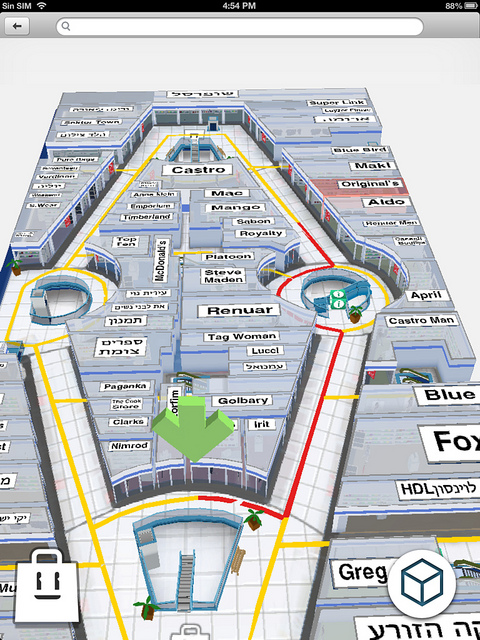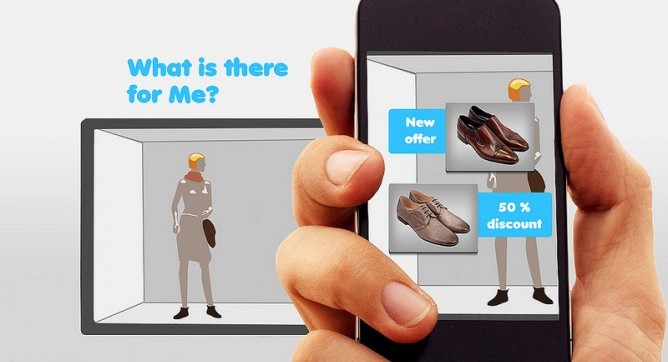While the Israeli app Waze is very good at helping you navigate the drive to a shopping mall, there is currently no great solution for finding your way once you’re inside.
Frida Issa, 31, a computer engineer from Israel, developed Mally to enable people to navigate in a closed environment like a shopping mall or even a museum.

- Mally shows you the way.
Shoppers download the app for free, and malls pay a setup and monthly fee. Store owners can upload deals and promos that they want to give to the shoppers, and Mally connects the dots.
Instead of relying on extra beacons or expensive, battery-draining hardware, Mally uses computer vision to help you get around the unknown space indoors with your smartphone’s built-in camera.

- Frida Issa, co-founder and CEO of Mally.
“All the other companies in the mall environment are trying to use hardware. They are installing Bluetooth or Wi-Fi spots or audio devices,” Issa tells ISRAEL21c. “Our solution is hardware-free.”
Once a 2D map of the indoor space is uploaded to Mally’s servers, a detailed 3D map is generated automatically for the shopper.
Point the camera at your location and give Mally a command. The app can help you find your favorite stores, the restroom, the shop running a sale on baby items, or even Santa. In the near future, it will also help you meet up with your friends somewhere in the same mall.
Upstaging Google
The idea was developed by Issa, a Christian Arab woman from the Haifa area, with a Spanish partner. The new app is already installed in a mall in Toledo, Spain, and two more malls are coming on board next. It is currently available in English, Hebrew, Spanish and Catalan.
“We are closing a deal with a shopping center’s administration agency, which is holding 47 malls in Spain. They all have Google Indoor [Google Maps on Android devices] already, but are totally unsatisfied with it,” she says.
“To map the malls around the world isn’t easy,” she continues. “We give the whole experience. When you enter, we not only help you navigate but also give you content and information — what offers are being made right now. “
For malls that have movie theaters, Mally can inform users of show times and allow them to purchase tickets through the app.
“Consider that there are now groups of mothers that buy things for children together. If 10 or more mothers go to a shop and buy the same thing, they’ll get a discount. It’s cheaper when they do it as a group.”
Mally was founded in 2012 with private capital under the Haifa, Israel-based company GeniusMatcher. The company will be seeking a half million to $1 million investment in the new year, says Issa.
The R&D for the company will remain in Israel no matter what, she adds. In a previous startup that she founded, which didn’t take off, Issa learned the hard way about the advantages of starting up in Israel. She couldn’t find the same caliber of developers in Europe.
Mally isn’t the first to enter the indoor GPS market from Israel. There is also WiseSec, which offers a box solution placed at the entrance of every shop. The company’s WiseBy is now being tested at the Moscow Mall.
Other local players from Israel include NavIn and IndoorGo, and they join dozens of other companies worldwide vying to capture the market.
According to GPS World, there is a huge potential for indoor GPS, or mobile Indoor Positioning (IPS). Major companies like Google and Apple (with their iBeacons) are already planting their footprint in the market, and if the plan succeeds there may be no more use for a cash register as mobile apps can even handle transactions.
The test of time will be how moms and mall rats respond to all these apps and services.
















